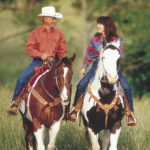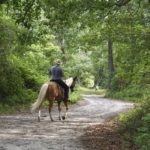
In 1967, a young, horseless Bob Cacchione went off to college, but missed his time in the saddle. He found a few like-minded friends and a local stable and formed a club.
He?d bring his friends out to rent horses for an hour, and in return, the stable owner allowed Bob to ride for an hour while instructing his friends for free.
Word spread quickly throughout the campus and soon Bob?s group of five friends grew to 40. When the college faculty heard this, they asked Bob to continue teach to horseback riding, as a one-credit physical education class.
At the request of his school, Bob then hosted a horse show. It was a huge success and soon other schools wanted to participate. Thus, the IHSA was born.
Learn more about IHSA in this Q&A with Cacchione:
H&R: What type of riders is the IHSA for?
Cacchione: Everybody. That’s just one of the unique things about IHSA. You could have ridden in camp when you were 10 years old and maybe never had the wherewithal to go beyond that. But you?ve always had that desire. When you go to college now, there’s a class for you. You can go in the walk/trot division and learn the basics and work your way up.
You need riders in every level to make a team. So walk/trot riders are counted just like the Medal/Maclay riders?as part of the team. You also have the individual situation. Everyone can qualify as an individual for regional zones through the national championship. So you have both scenarios. The IHSA is really open to everyone.
We’ve had riders come through that started in the open level when they were in college, because of their background: Beezie Madden, Peter Wylde, Mark Weissbecker. They?ve all won the cash open and gone on to the Olympics.
Then you see a lot of the walk/trot and walk/trot/canter riders (novice riders) who move up the levels and when they graduate, many of them end up buying a horse. They maybe only dreamed of that and never thought the reality could take place. Today, that’s not true.
H&R: Does IHSA provide the horses for the shows and how do those shows work?
Cacchione: Yes. Not only at the regional shows, but also all the way up to the national championships.
The riders stay within their regions throughout the school year. Then they have a regional final. By the second week of April, the zone finals are held, then the national championships. The championships rotate locations.
We’ve had to move to bigger venues for the national championships because we bring in 150 horses. About 80 of them are huntseat and the rest are Western.
H&R: What makes a horse really good for IHSA?
Cacchione: Many of these horses, around the country, are donated. So they get a second chance. They?re no longer able to do the four-foot or open jumping. These horses are able to get that second chance and become great IHSA horses.
The students get the opportunity to ride these incredible horses.
H&R: What are some of the benefits to the riders for competing in IHSA?
Cacchione: First of all, they have a chance to start at their level?whatever it may be. Even if they are a former Medal/Maclay rider, they?re going to start at their level and compete with like riders.
Second of all, everyone has to draw horses out of a hat?from the first show of the season all the way up to nationals. So that levels out the playing field. So everybody is in the same position. Everybody gets the same scenario.
Another thing that’s very important is the team camaraderie. These kids, if you go to an intercollegiate show?whether you go to one during the regular season of the nationals?you see a lot of the Medal/Maclay riders who?ll finish their classes, take off their jackets, roll up their sleeves, and they?re out there helping the walk/trot riders get into the ring. The team camaraderie is a major thing, and these kids make lifelong friends. I see that as one of the important elements in this whole thing.
H&R: How would you finish this sentence? It’s good to try IHSA competition if?
Cacchione: If you want to learn how to ride different horses, which will help you and make you a better rider.
H&R: How would an interested high school or college student learn more?
Cacchione: What I recommend to anyone is to go to our Web site ihsainc.com and click on to where all the colleges are by region and zone. First, look for a curriculum that’s of interest to them. The second thing should be riding. Unless they?re interested in equine studies.
Then click on to the links of the colleges to learn more about their IHSA programs. That would help, especially for juniors and seniors in high school. When they go visit the schools, they should also visit the facilities where the programs are and where the school rides. Some schools have their own facilities, and others have a place off campus where they ride.





